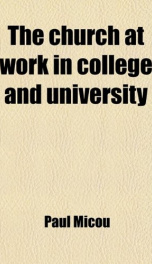the church at work in college and university

Purchase of this book includes free trial access to www.million-books.com where you can read more than a million books for free. This is an OCR edition with typos. Excerpt from book: CHAPTER III Church Student Organizations is organization desirable? One of the first questions to arise in Church student work is whether an organization is desirable. Practically all workers would claim that it is, though the machinery should be reduced to a minimum. Considering the multiplicity of college organizations it is a pity that another should be needed for Church work. Yet, if students are to have any voice in their Church affairs, or are to have any share in Church life other than worship, they need to have a medium of corporate action. Types of organization now existing The first thing that strikes one in studying Episcopal student work is the great variety of societies which have sprung up to meet local conditions. Possibly a reason for this is to be found in the fact that there is no general young people's society in our Church such as exists in other communions. If there were, its chapters would be established in colleges, and a familiar method of work would await our students on going to college. Some of the general Church societies have reached into the colleges, but theparochial character of these organizations has, as a rule, prevented their adaptation to college life. Parochial organizations with branches in the colleges The organization of this type most generally met with in the colleges is the Brotherhood of St. Andrew. Sometimes it is the only Church society for the men students, as at the University of North Carolina, and sometimes it is the nucleus of a larger club, which meets less frequently, and includes all the Episcopalians, as at the University of Virginia. A college chapter of the Brotherhood quickly finds itself engaged in many kinds of work that are not generally part of its functions in a parish. Consequently it would seem to do ...
Info about the book
Author:
Series:
Unknown
ISBN:
1421411229
Rating:
5/5 (10)Your rating:
0/5
Languge:
English
Users who have this book
Users who want this book
What readers are saying
What do you think? Write your own comment on this book!
write a commentif you like the church at work in college and university try:
Other books by this author
Do you want to exchange books? It’s EASY!
Get registered and find other users who want to give their favourite books to good hands!


